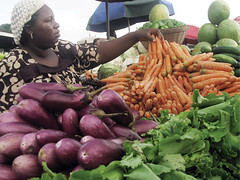
Agricultural production and distribution are essential in the process of African development.
Originally uploaded by Pan-African News Wire File Photos
January 16 2011 at 08:09am
By Ingi Salgado
--------------------------------------------------------------------------------
Agricultural research produced in partnership with the Bill and Melinda Gates Foundation concluded last week that Africa should stop relying on just a handful of crops and developing new seeds as the default solutions to end hunger and poverty.
The message, outlined in a report by the Worldwatch Institute, appears out of step with the Gates foundation’s funding of agrotechnology initiatives to achieve agricultural development in Africa.
The foundation’s partnership with genetically modified (GM) company Monsanto has given rise to accusations it is opening up new markets in Africa for the multinational group to monopolise seed markets in Africa.
Microsoft founder Gates raised the ire of non-government organisations (NGOs) in August when his foundation’s $27.6 million (R192m) investment in GM company Monsanto was disclosed. The foundation also operates a stream of funding flows to open African farming markets to GM companies’ products, and has plans to introduce GM soya into southern Africa with Cargill.
Arising from two years of research in 25 African nations, the Worldwatch Institute report says seed selection and breeding, including that using “advanced scientific” methods, would continue to play a role. But the focus should be on incorporating better seeds in diverse agro-ecological systems.
It says that the global search for “the right seed” had eroded crop diversity, caused soil neglect and diverted other on-farm investments.
While similar positions have long been held by NGOs aiming to eradicate hunger and poverty, the “beyond seeds” approach now appears to be emerging in mainstream discourse – although the Gates’ foundation insisted last year it took a comprehensive approach to agriculture, including seeds, soil, farm management, market access and effective policies.
African Centre for Biosafety director Mariam Mayet welcomed the admission in the research that agro-ecological systems could feed much of the world, but expressed concern that the research was a smokescreen to minimise heavy criticism against the foundation.
She said the foundation’s work in agrotechnology usually involved “turning up with multinational companies to open up the space for monoculture crops”.
The report itself made oblique reference to the profit motive of seed companies. It said: “If seed represents the short-term payoff option, the truly long-term investment with big returns is investing in the soil and water that nourish crops.”
It noted that few companies had figured out ways to profit from encouraging the rebuilding of soils or acquifers.
Africa’s agricultural export potential has captured the attention of emerging superpowers like China, as well as western philanthropists.
Together with the Rockefeller Foundation, the Gates’ foundation established the Alliance for a Green Revolution in Africa five years ago, a harkback to the Green Revolution in Asia that doubled cereal output in two-and-a-half decades from 1965, but depleted soils. The African alliance says it aims to duplicate these efforts but with greater attention to soil and water management.
Gates said in a 2010 newsletter that the foundation’s agrotechnology funding went towards mostly marker-assisted breeding, but also included some genetic modification.
Transgenic technologies accounted for about 6 percent of the foundation’s total investment in agriculture and nutrition.
Worldwatch Institute president Christopher Flavin said that by combining the foundation’s focus on agricultural productivity with the institute’s brief on finding environmentally sustainable approaches to agriculture, “we are building a new bridge that may open a better future” for poor farmers.
Until recently, he said, policymakers had believed that the only route to advancing African agriculture was to “double down on the Green Revolution” by making more productive seeds and fertiliser available to raise yields. It was a “seductively simple formula”, but had not worked in many cases.
“The seeds and fertiliser are often too expensive for the vast majority of poor farmers, or they are simply unavailable. And the benefits of many such projects go to a small number of large farmers who may produce abundant food, but do little to promote rural development,” said Flavin.
“We must dispense with simple truths like ‘bigger is better’ and avoid the search for silver bullet solutions to complex problems.”
Fuelling this complexity are rising food prices, linked to a host of factors including higher input costs and shifting weather. The UN Food and Agricultural Organisation said this month that sugar and meat prices were at record highs, while prices for wheat, rice, maize and other cereals had outstripped the 2008 crisis levels that sparked riots.
The UN’s caution for further price increases is particularly worrying for Africans living in poorest countries, which are twice as dependant on food imports today as two decades ago, says the report.
It adds the debate on whether agro-ecological production, defined as biologically-based and integrated soil, plant and animal cropping systems, will be able to meet global food demand was “misplaced”. - Business Report
No comments:
Post a Comment